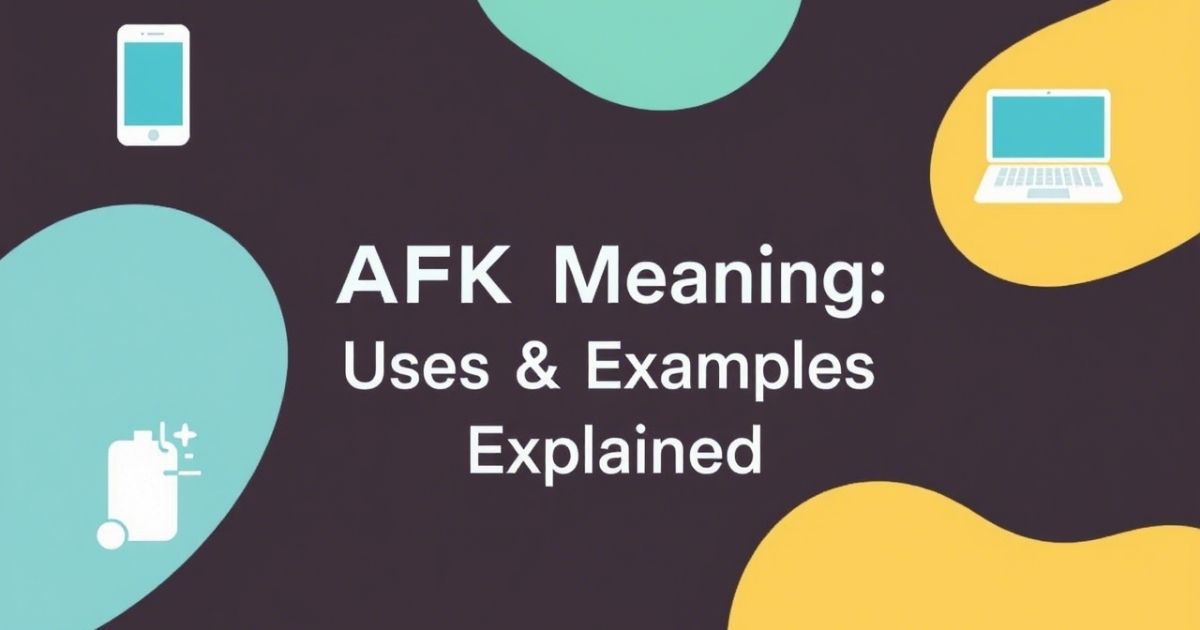Ever been in the middle of a game or work chat and seen “AFK” pop up? It stands for “Away From Keyboard,” and it’s more common than you think! Whether you’re texting a friend, gaming, or collaborating with coworkers, “AFK” is a quick way to let others know you’re stepping away, even if it’s just for a minute.
In gaming, “AFK” helps players communicate when they’re temporarily absent. It’s not just for games, though. Remote workers and social media users often drop an “AFK” in chats to say they’ll be back soon. Next time you see it, you’ll know exactly what it means and how important it is for keeping communication clear and smooth online!
What Does AFK Mean?
AFK stands for “Away from Keyboard.” It’s a term used to let others know that you’re temporarily stepping away from your device. The message is clear: you’re not actively participating but will return shortly. Originally used in the world of gaming, AFK has become a popular term in everyday conversations, from work chats to social media.
In gaming, AFK often signals that a player is no longer actively playing but remains logged in. Over time, this term made its way into casual text messages, work-related communication, and online platforms, making it a common part of digital slang.
Examples in Conversations:
- Gaming: “AFK for 10 minutes, need to grab a drink.”
- Workplace: “AFK for lunch, back in 30 minutes.”
- Social Chats: “AFK for a bit, taking the dog for a walk.”
While AFK is used to show temporary absence, it helps keep communication clear and ensures others know you’ll be back soon. It’s a handy tool for avoiding confusion in both personal and professional digital interactions.
Where Did It Come From?
The term AFK originated in the early days of online gaming, particularly in multiplayer online games like EverQuest and World of Warcraft. Players would use AFK to let others know they were temporarily stepping away from the game but still remained logged in. This helped avoid misunderstandings and ensured teammates knew the player wasn’t available for a short time.
As online communication expanded to other digital spaces, AFK quickly spread beyond gaming. It became a popular term in chat rooms, social media, and even work settings. Gamers weren’t the only ones using it anymore—remote workers, social media users, and others in the digital world adopted AFK to signal a brief absence from their devices.
Now, AFK has become part of digital slang, with its usage growing beyond gaming and online communities. It’s a simple, effective way to communicate temporary absence in today’s fast-paced digital world.
My First AFK Experience

My first AFK experience happened when I was deep into an online game with friends. We were playing EverQuest, and suddenly, I had to step away from my computer for a quick break. I didn’t want to leave my team hanging, so I typed “AFK for 5 minutes” in the chat.
At first, it felt a little strange to be away from the keyboard while still logged in. I was worried I might miss something important or hold up the group. But when I came back, my friends had all simply carried on, and the game kept moving forward. They understood exactly what “AFK” mean, and I was able to rejoin without any hassle.
That moment made me realize how useful this little acronym is. It’s a quick and clear way to communicate with others when you need to step away, whether you’re gaming, working, or just chatting online. Now, I use AFK regularly, and it always gets the point across!
When and How Do People Use AFK?
People use AFK when they need to step away from their device for a short period of time. It’s a way to let others know you’re temporarily unavailable without having to explain why you’re away. Whether you’re playing a game, in a work chat, or having a conversation on social media, AFK helps avoid confusion and ensures that others know you’ll be back soon.
Here are some common scenarios for using AFK:
- Gaming: When playing multiplayer games, players often use AFK to let teammates know they’re taking a break. For example, “AFK for 5 minutes, I’ll be right back.”
- Work: In remote work settings, AFK is used to let colleagues know you’re stepping away from your computer. A message like “AFK for lunch, back in 30” keeps things clear.
- Social Chats: On platforms like Discord, Instagram, or even texting, you might see someone use AFK when they need to take a break. For example, “AFK to grab a coffee, TTYL!”
Overall, AFK helps maintain clear communication when someone is briefly absent, whether it’s for a snack, a meeting, or just a quick pause.
Examples in a Sentence
When you’re away from your device for a short period, it’s common to let others know you’re temporarily unavailable. Here are some examples of how this can be used in different contexts:
- Gaming: “I’ll be back in 5 minutes, just need a snack.”
- Workplace: “Stepping away for a quick meeting, will return shortly.”
- Social Chats: “Taking a quick break, be right back!”
- Group Chats: “Out for a walk, catch you later!”
- Remote Work: “Running errands, but will be available after lunch.”
Who Uses AFK?
AFK is commonly used by various groups to indicate a temporary absence from their device. It helps keep communication clear and prevents confusion, whether you’re gaming, working remotely, or chatting with friends. Here are some ways AFK is used:
- Gaming: Players use AFK to inform teammates they’re taking a break. For instance, “I’m AFK for a few minutes to grab a snack,” so others know not to rely on them for the moment.
- Remote Work: In work chats, AFK helps colleagues understand when someone steps away for a short break. “I’m AFK for lunch, back in 30,” ensures everyone knows you’ll return soon.
- Social Chats: On platforms like Discord or Instagram, users post AFK to let friends know they’re stepping away. “Out for a walk, AFK, will reply later,” keeps the conversation flowing without confusion.
- Study Sessions: In online study groups, AFK can signal a short pause. “Sorry, AFK for a moment, will catch up on the notes shortly” lets everyone know you’ll return soon.
- Team Collaboration: In apps like Slack or Microsoft Teams, AFK ensures team members know when you’re not available. “Taking a quick break, AFK” lets others know you’re not ignoring their messages but need a short pause.
When to Use AFK: Tips for Etiquette
Knowing when to use AFK is important for good digital communication. Whether you’re gaming, working remotely, or chatting with friends, here are a few tips to keep in mind for proper AFK etiquette:
- Don’t Leave Without Notifying Others: If you’re in the middle of a game or work task, let others know when you need to step away. A simple “AFK for a few minutes” avoids confusion and keeps things running smoothly.
- Use It for Short Breaks: AFK is meant for brief absences. It’s not ideal for long periods of inactivity. If you’ll be gone for an extended time, let others know when you’ll be back or when they can expect you.
- Be Considerate of Timing: Don’t use AFK in the middle of important tasks or conversations unless it’s truly necessary. For example, in work settings, use it for breaks, but make sure to be responsive when required.
- Use It in Multiplayer Games: In gaming, especially in team-based games, letting others know you’re AFK ensures that your team understands you’re temporarily unavailable. Always try to be back quickly so you don’t leave your teammates stranded.
- Keep It Short and Clear: Don’t over-explain your absence. A simple message like “AFK for lunch” or “AFK for 10 minutes” gets the point across without cluttering the conversation. Keep it brief, polite, and informative.
Synonyms and Alternatives for AFK

While AFK is widely recognized in gaming, work, and social media, there are several synonyms and alternatives you can use to convey the same idea of being temporarily away from your device. Here are some common options:
- BRB (Be Right Back): This is a classic alternative to AFK, commonly used in chats and gaming. It’s quick and clear, letting others know you’ll be back shortly.
- Out for a Bit: Used in casual settings, this phrase indicates a short absence without the formality of acronyms. It’s clear and friendly.
- Gone for a Moment: A polite way to indicate a brief break, commonly used in both work and social chats.
- Stepping Away: A simple, easy-to-understand phrase used to let people know you’re briefly unavailable, often used in professional settings.
- On a Break: This one is often used in work environments or group chats to indicate a short pause from activity.
Antonyms of AFK
The antonyms of AFK (Away From Keyboard) describe when someone is present and actively engaged online or at their device. Here are some antonyms:
- Active – Indicates that someone is engaged and present at their device.
- Online – Means the person is connected to the internet or a service.
- Present – Suggests that the individual is available and ready to participate.
- Available – Shows that the person is reachable and not absent.
- Engaged – Refers to someone actively participating in a conversation or task.
These terms indicate the opposite of being away from the keyboard and imply a state of being present and involved.
Related Guide:
Idioms for Power in Conversations – Verbo Master
What Are Some Words with Opposite Meanings?
Knowing the opposite of “AFK” can be useful in many situations. Here are some antonyms or related terms:
- Online: Indicates that you’re connected to the internet and actively engaged on your device.
- Present: Often used in meetings or work environments to show you’re available and ready to participate.
- Active: Used to describe someone who is engaged, whether in gaming or social interactions.
- Engaged: Shows you’re involved in a task or conversation, making it clear you’re not absent.
Using terms like “active” or “present” helps communicate when you’re available and engaged in digital spaces.
Similar Phrases in Internet Slang
There are several internet slang phrases that are similar to AFK, used to indicate temporary absence. Phrases like BRB (“Be Right Back”), GTG (“Got To Go”), and BBS (“Be Back Soon”) all communicate that someone will return shortly. These terms are commonly used in gaming, chats, and work environments to let others know you’re stepping away, but not for long.
- BRB — “Be Right Back”
- GTG — “Got To Go”
- BBS — “Be Back Soon”
- TTYL — “Talk To You Later”
- AFM — “Away From Mouse”
- Out — “Stepping Away”
- On Break — “Taking a Short Break”
Why Is AFK So Popular?
- Simplicity: A quick, easy-to-understand term, AFK reduces the need for lengthy explanations.
- Universality: It’s used across various platforms, from gaming communities to work chats, making it widely recognized.
- Time-saving: The abbreviation lets users quickly convey their absence, saving valuable conversation time.
- Informality: AFK adds a casual tone to digital communication, making interactions feel more relaxed.
- Consistency: Using a standard term like AFK helps keep communication consistent and clear across different digital environments.
The Story Behind AFK

AFK (Away From Keyboard) has its roots in the early days of online gaming and internet chat rooms. It began as a way for players to inform others that they were stepping away from their computer, without disrupting the flow of communication. As multiplayer games grew in popularity, especially in the 1990s with titles like EverQuest, players needed a quick way to signal they were temporarily unavailable. This led to the creation of AFK.
Over time, AFK expanded beyond gaming and into broader internet culture. It found its place in chat rooms, social media, and remote work environments, where people needed an easy way to say they were taking a break or stepping away briefly. Today, AFK is used by gamers, remote workers, and social media users alike, becoming a staple in digital communication.
Its simplicity and versatility have made it an essential part of internet slang, helping people stay connected while acknowledging their temporary absence.
FAQ’s
What does AFK mean?
AFK stands for Away From Keyboard. It means someone is temporarily not at their computer or device.
What does AFK mean in Gen Z?
For Gen Z, AFK still means Away From Keyboard. It’s often used in texts and gaming to show when someone is offline or taking a break.
What is AFK gaming?
AFK gaming happens when a player is not actively participating in a game. They are usually away from the keyboard but still logged in.
What does AFK mode mean?
AFK mode is a setting in some games where players are inactive. It’s used to avoid penalties while away for a short time.
What does AFK mean from a girl?
When a girl says AFK, it simply means she is stepping away from the chat or device temporarily, just like anyone else.
Conclusion
“AFK” is a simple but important term in today’s digital world. Whether you’re gaming, chatting, or working remotely, you’ll likely come across “AFK” quite often. It tells others that you’re stepping away for a short time, but you’ll be back soon. This helps keep communication clear and avoids confusion.
In gaming, “AFK” is used to signal when a player is not present. It’s also common in work chats and social media platforms. Saying “AFK” shows respect for others by keeping them informed. It’s part of the digital slang that has become a regular part of online communication. So, next time you use it, remember AFK helps make online interactions smoother and more efficient.

Atlas Reid is an experienced administrator with 5 years of expertise in managing operations, streamlining processes, and ensuring efficiency. Skilled in leadership, organization, and problem-solving to drive business success.








